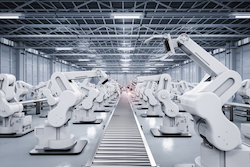A new generation of scientists sets the stage for Industry 4.0
The fourth industrial revolution is coming soon, and at its core is the full integration of digital and physical technologies enabled by progress in artificial intelligence, cognitive technologies and the Internet of Things. The promise for citizens? Better working conditions, sustainability and product personalisation to a level never seen before. Getting there, however, requires a new generation of brilliant scientists: notably specialists who will be tasked with creating the advanced robotics technologies at the heart of Industry 4.0. Training these up-and-coming roboticists is precisely what the SMART-E project was about. “SMART-E is a world-class doctoral training and research programme,” says Prof. Samia Nefti-Meziani, coordinator of the project on behalf of the University of Salford. “It focused on advanced robotics for sustainable manufacturing, and its results will allow European manufacturing companies to adapt their production processes to the trends defining Industry 4.0. “By doing so, it ensured Europe’s competitiveness, creating jobs for high-level skill operators, and increasing productivity. It also provides SMART-E Fellows with complementary business, leadership and interpersonal skills, and exposes them to different working cultures in academic and business sectors internationally.” The SMART-E project involved 13 Early Stage Researchers (ESR) and three Established Researchers (ER). Their objective: the development of ground-breaking technologies with emphasis on the likes of dexterous, soft and compliant robotics for manufacturing; reconfigurable and logistics robotics, and, finally, safety aspects, human-robot interaction and cooperation. One example of the project’s innovative solutions is a Smart-E gripper prototype conceived by the University of Salford. The UK nuclear industry has already recognised the potential of this Smart-E gripper, incorporating it into a recent project awarded by the Nuclear Decommissioning Authority (NDA) in Sellafield, for use in nuclear decommissioning. Another example is flexible machining using robots instead of expensive CNC machines, which the Advanced Manufacturing Research Centre is currently exploiting with a company that Prof Nefti-Meziani says, “will save millions of pounds in capital and operational costs over the coming years.” All in all, SMART-E has provided hands-on experience in robotics research to academics and industrial partners. It produced world-class results and provided researchers with an opportunity to collaborate with a number of industrial partners who joined the Network throughout the duration of SMART-E. Results have been disseminated in the form of publications, Shangh’AI lectures series in Advanced Robotics for Sustainable Manufacturing, conferences, summer schools, engagement events, industrial presentations and patents. “The fellows filed 2 patents and published more than 43 papers – 11 in scientific journals and 33 in proceedings of international conferences (with awards). These papers were published in journals with an impact factor ranging from 0.987 to 8.649” Prof Nefti-Meziani explains. “Over one third of our conference papers were presented at leading control and robotics conferences such as IEEE/RSJ International Conference on Intelligent Robots and Systems (IROS), the IEEE International Conference on Robotics and Automation (ICRA) and American Control Conference (ACC).” Sixteen of the project’s research fellows were also recruited by major research organisations and industries. With the project now over, Prof Nefti-Meziani says that the next stage will consist in applying for further European funding, “to take all research outputs to commercialisation stage.” These efforts will not only benefit current SMART-E industrial partners from the food and aerospace sectors, but also other sectors like Health and Space.







